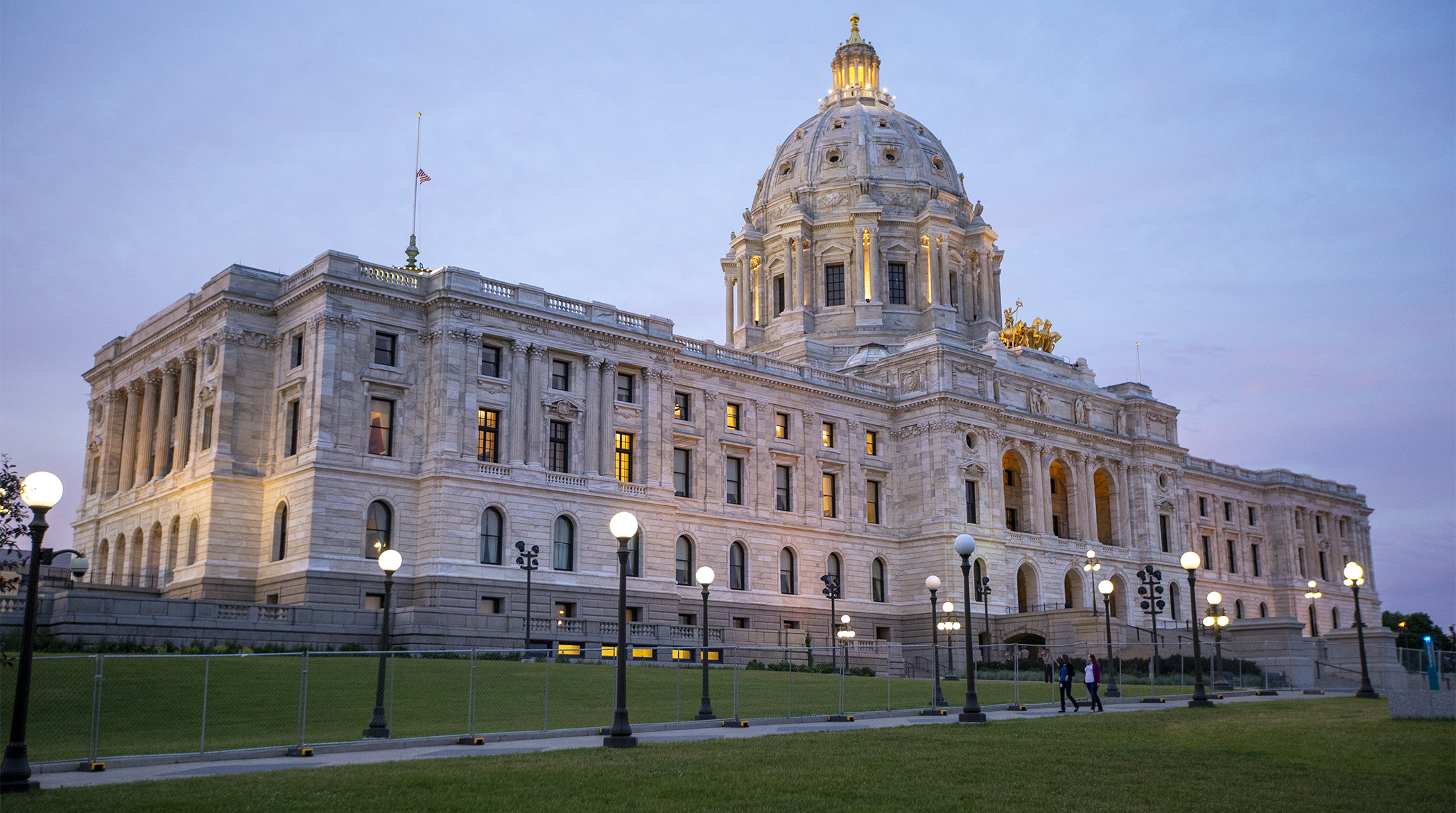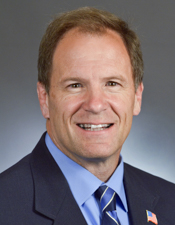Last chance? Bonding bill headed to House Floor

The Legislature’s fifth special session of the year began Monday with hopes that several important pieces of unfinished business may finally be resolved in the coming days.
Chief among them is a $1.87 billion package of public works projects that supporters say will provide a much-needed boost to the economy, but that has already twice failed when similar legislation did not muster the 81 votes it needed to pass in the House. However, with the election little more than three weeks away, that may be about to change.
Speaking to reporters before session began, House Speaker Melissa Hortman (DFL-Brooklyn Park) said she believes six Republicans may vote with all 75 DFL House members to provide the three-fifths majority a bonding bill must have for approval.
“I think we’re at a point where we have enough minority members onboard to pass a bill on Wednesday,” Hortman said. “… We have to have a vote on this bill. This will be the third, and perhaps final, opportunity for the GOP to join us.”
She said the House and Senate leaders have reached agreement on a final version of the bill, an assertion later challenged by Senate Majority Leader Paul Gazelka (R-Nisswa) who said in a statement there is “not an agreement on the bill – yet” and that it is in jeopardy because of “backroom antics.”
Hortman said in order to comply with House rules the bill, SSHF1, which was introduced Monday, would be given its second reading Tuesday and come up for a vote on Wednesday. And the House Ways and Means Committee kept to that schedule Monday night, voting 18–10 along party lines to send the bill to the House Floor.
SSHF1 includes $1.36 billion in general obligation bonding that would be used to fund improvements to roads and bridges, wastewater treatment facilities, college and university buildings, and dozens of other projects. It also contains several tax provisions and $31 million in supplemental budget spending.
Rep. Pat Garofalo (R-Farmington) was one of several Republican members to voice opposition to the bill, saying that cutting taxes while increasing spending was “an odd way” to balance a state budget facing a multi-billion dollar deficit.
“I’ll be voting no on this bill,” Garofalo said. “I don’t enjoy spending that is not paid for. It works for Washington, but it doesn’t work for Minnesota.”
The bill’s bonding provisions would also provide $300 million in trunk highway bonds to be used for rail grade separation projects ($110 million), state highway construction ($84 million) and flood mitigation efforts ($23 million), among other purposes. And the bill includes $100 million in housing infrastructure bonds to help buy or build housing for low-income residents.
Major appropriations in the bill include:
- $327.6 million – Department of Transportation
- $269.1 million – Public Facilities Authority
- $161.8 million – Department of Employment and Economic Development
- $104.4 million – Department of Natural Resources *
- $90.1 million – Minnesota State University *
- $88.4 million – Metropolitan Council
- $75.4 million – University of Minnesota
- $50.3 million – Department of Public Safety
- $44.5 million – Department of Corrections
- $27.4 million – Department of Human Services
- $27.1 million – Pollution Control Agency
- $24.5 million – Military Affairs
- $24 million – Board of Water and Soil Resources
- $20.8 million – Department of Health/Department of Agriculture
- $16 million – Housing Finance Authority
- $13 million – Minnesota Zoo
- $8.9 million – Minnesota State Academies
- $6.7 million – Department of Veterans Affairs
- $6.1 million – Amateur Sports Commission
- $4.7 million – Department of Administration
- $3.9 million – Department of Education
- $3.1 million – Minnesota Historical Society
- $750,000 – Perpich Center for Arts Education
* These totals do not include the trunk highway ($300 million) or housing infrastructure ($100 million) bonding appropriations.
Some of the largest single-project expenditures in the bill include:
- $55 million to the Met Council to increase bus rapid transit;
- $52 million to replace the Third Street Kellogg Bridge in St. Paul;
- $29.5 million for a new state emergency operations center;
- $29.2 million to replace a child development building at the University of Minnesota;
- $24 million for wastewater infrastructure in Oronoco;
- $20.5 million to build infrastructure for a business park in Becker;
- $18 million for the Lake Bronson Dam in Kittson County;
- $13.5 million for seawall and surface improvements in Duluth;
- $13 million for wastewater treatment in Randolph; and
- $12.5 million for an outdoor performance venue in Minneapolis.
[MORE: A full list of appropriations and projects.]
Tax provisions
SSHF1 also contains several tax provisions, including one that Rep. Paul Marquart (DFL-Dilworth), chair of the House Taxes Committee, said has been a priority for those members all year. It would make full section 179 expensing on like-kind exchanges (trade-ins), retroactive for tax years 2018 and 2019.
Marquart said the change would help farmers and small businesses by allowing them to take a 100% deduction in the first year of a purchase when equipment is put into operation.
He said changes to the federal tax code a couple of years ago created a problem in Minnesota because they required trade-in value to be counted as income. This meant farmers and small-business owners were hit with tax increases because the state tax code only allows a 20% deduction in the first year. The proposed change would align Minnesota with the federal tax code by allowing a 100% deduction.
“This bill fixes that problem, it has always been our No. 1 priority in the tax committee,” Marquart said. “This is now our second chance and we can get it done.”
He said there are five other tax provisions in the bill, including one that would allow the Minnesota State High School League to use some of the revenue it generates from sales at sectional and state tournaments, which are tax exempt, for operating costs over the next couple of years. The MSHSL said this would help make up for revenue lost due to the COVID-19 pandemic.
Supplemental state government spending
The bill calls for a net $31.37 million in General Fund spending for fiscal year 2021 budget boost to help meet state needs.
[MORE: View the spreadsheet]
Rep. Lyndon Carlson Sr. (DFL-Crystal), the House Ways and Means Committee chair, said funds are from agency savings and a 2021 General Fund appropriation change to the Department of Human Services for Medical Assistance which results in a nearly $25.06 million savings. That comes from the federal government’s 6.2% increase in its reimbursement rate for Medical Assistance.
The largest amount in the bill is almost $16.03 million to support Department of Human Services’ direct care and treatment services.
The bill also includes provisions resulting from the Memorial Day death of George Floyd.
It would provide the state patrol with $5.07 million from the Trunk Highway Fund to cover its deployment costs during the resulting civil unrest. Also from the fund would be $865,000 to the Transportation Department for its civil unrest response costs.
Rep. Paul Torkelson (R-Hanska) finds it “surprising” those funds would be used for civil unrest compensation. “We think that trunk highway funds are meant to build roads and bridges across the state of Minnesota. We understand the state patrol is an important part of transportation. … In this case the state patrol was used not to keep our highways safe, but to deal with civil unrest on city streets.”
No committee member could provide a reason for the decision other than it came from legislative leaders.
Additionally, $3.58 million would come from the General Fund “for costs related to the civil unrest in the Minneapolis-St. Paul area” and $2.11 million would be for Department of Natural Resources’ costs associated with the response to civil unrest.
Also coming from the Trunk Highway Fund would be almost $7.17 million for patrolling highways and $648,000 for commercial vehicle enforcement staff and operating costs.
Other proposed funding in the bill, all from the General Fund unless noted, includes:
- $7.5 million to the Department of Corrections for overtime and staffing costs;
- $3.1 million to the Bureau of Criminal Apprehension for testing of unrestricted sexual assault examination kits, storage of restricted kits, and development of a website for sexual assault survivors to learn the status of the testing of their sexual assault examination kit;
- $1.39 million for the BCA to enhance its capacity for forensic testing to combat violent crime; and
- $1.28 million for capitol security costs.
Related Articles
Search Session Daily
Advanced Search OptionsPriority Dailies
Ways and Means Committee OKs proposed $512 million supplemental budget on party-line vote
By Mike Cook Meeting more needs or fiscal irresponsibility is one way to sum up the differences among the two parties on a supplemental spending package a year after a $72 billion state budg...
Meeting more needs or fiscal irresponsibility is one way to sum up the differences among the two parties on a supplemental spending package a year after a $72 billion state budg...
Minnesota’s projected budget surplus balloons to $3.7 billion, but fiscal pressure still looms
By Rob Hubbard Just as Minnesota has experienced a warmer winter than usual, so has the state’s budget outlook warmed over the past few months.
On Thursday, Minnesota Management and Budget...
Just as Minnesota has experienced a warmer winter than usual, so has the state’s budget outlook warmed over the past few months.
On Thursday, Minnesota Management and Budget...

